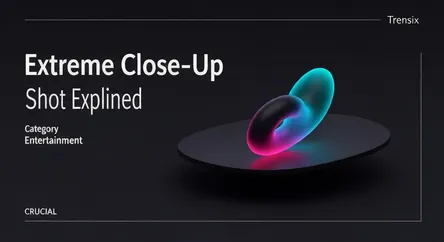Entertainment
Extreme Close-Up Shot Explained

Discover the extreme close-up (ECU), a powerful film shot that magnifies details to heighten emotion, create intimacy, and build intense suspense.
What is it?
An extreme close-up (ECU) is a foundational camera shot in filmmaking that frames a subject incredibly tightly, isolating a specific detail. Unlike a standard close-up that might show a person's whole face, an ECU focuses on a much smaller area, such as a character's eyes, mouth, or a significant object like a ticking watch or a key turning in a lock. Its purpose is to direct the viewer's attention to a detail of utmost importance, removing all other distractions from the frame.
Why is it trending?
This technique is perpetually popular in storytelling due to its intense emotional impact. In high-definition cinema and character-driven series, the ECU serves as a powerful tool to pull the audience into a character's psychological space, revealing subtle emotions that dialogue can't convey. It's a staple in thrillers to build suspense and in dramas to forge a deep connection between the audience and a character's feelings. Its effectiveness ensures it remains a go-to shot for filmmakers aiming for maximum impact.
How does it affect people?
The ECU has a significant psychological effect on the audience. By magnifying a detail, it creates a sense of intimacy or, conversely, claustrophobia and discomfort. Seeing only a character's tearful eye or nervous fingers makes their emotional state feel immediate and personal. This forced focus can make viewers feel like they are sharing a private moment, heightening empathy, or it can create intense anxiety by highlighting a threatening detail. It is a masterful tool for manipulating audience emotion and perspective.